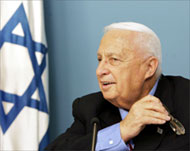Olmert moves to centre stage
Israel’s interim prime minister Ehud Olmert is moving further to the forefront of the Israeli political scene saying he hopes to resume peace talks with the Palestinians if he is victorious in the forthcoming general election.

Olmert said such talks would depend on fulfilment of Israel’s longstanding demand that Palestinian militant groups disarm. The condition was part of a US-brokered road map to peace.
Olmert told reporters: “I hope that based on the results of their (25 January) elections I will be able to enter into negotiations with (Abbas). That depends on whether he will uphold his commitments to disarm terror groups.”
Also, in one of his first forays into foreign policy since being named as interim leader of Kadima, the centrist party formed by Ariel Sharon prior to his massive stroke, Olmert said that Israel would not let anyone who threatened its existence obtain weapons of mass destruction.
The comments were a thinly veiled warning to Iran on the day an Israeli delegation of atomic experts headed to Moscow for talks over Tehran’s nuclear programme.
Israel has come to regard Iran as its number one enemy following a series of inflammatory statements by Iran’s president Mahmoud Ahmadinejad, including saying that Israel should be “wiped off the map”.
Higher profile
In talks with Moshe Katsav, the Israeli president, he said he believed a diplomatic solution was possible before Iran was able to obtain nuclear weapons.
“Israel cannot allow in any way or at any stage someone who has such hostile intentions against us to obtain weapons that could threaten our existence,” he said.
The declarations by Olmert reinforce recent media coverage in Israel suggesting that a quiet acceptance that Ariel Sharon is not returning to political life now prevails in the country.
Two weeks after Sharon was felled by a massive stroke, updates on Sharon’s condition are now only the second or third item on news agendas.
The political focus has shifted to Olmert, a career politician and close ally of the stricken prime minister.
Yaakov Sheetrit, a Jerusalem shopkeeper, echoed the sentiments of many when he talked about Sharon.
“We can’t just rest our hopes on one man, much as I admire him,” he said. “I want someone to preserve what he built.”
Business as usual
Sharon leaves behind a party system in flux. As well as Olmert at the helm of the newly formed Kadima, Likud and Labour are also contesting the 28 March general election.
Proof that the initial shock of his departure has subsided was evident when Israel’s political satirists once again began poking fun at politicians.
 |
|
Even a leader as charismatic |
The popular television show Eretz Nehederet aired its first spoof of Olmert last Friday where an artist imitating Olmert is asked if he thought politicians were cynically abusing Sharon’s condition for personal gain.
The Olmert character responded: “I think I am interested in taking a stick and checking to see how your left side reacts to pain.”
Gidean Rahat, a political lecturer at Jerusalem’s Hebrew University, said the return to business as usual indicated the strength of Israeli democracy.
“Every man has his replacement, even a charismatic leader who was respected by a wide segment of society,” he said.